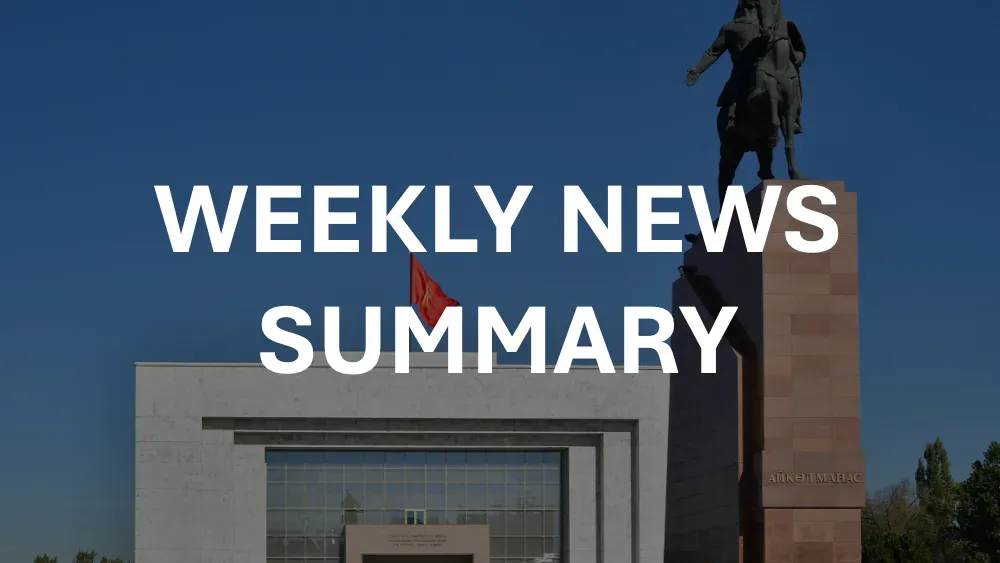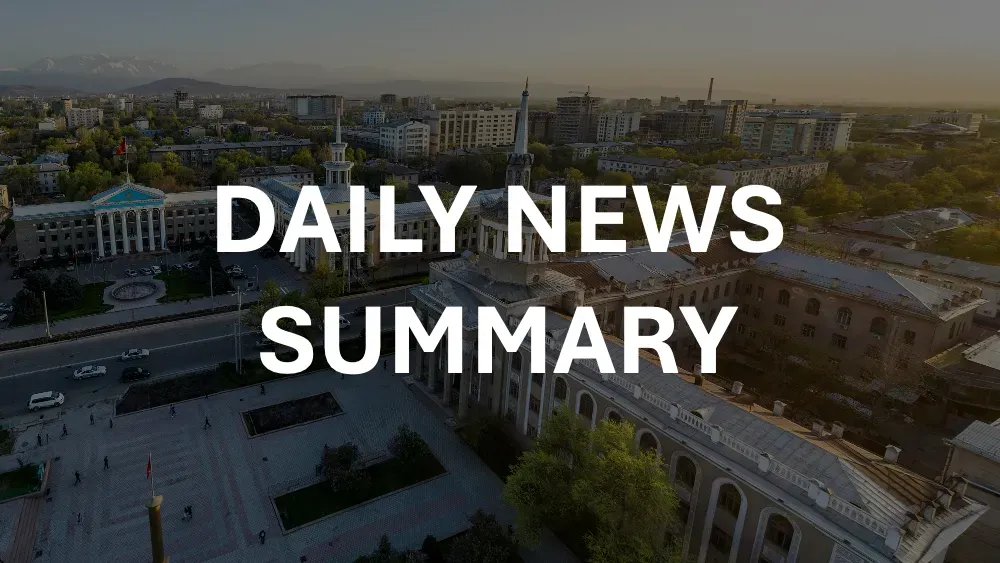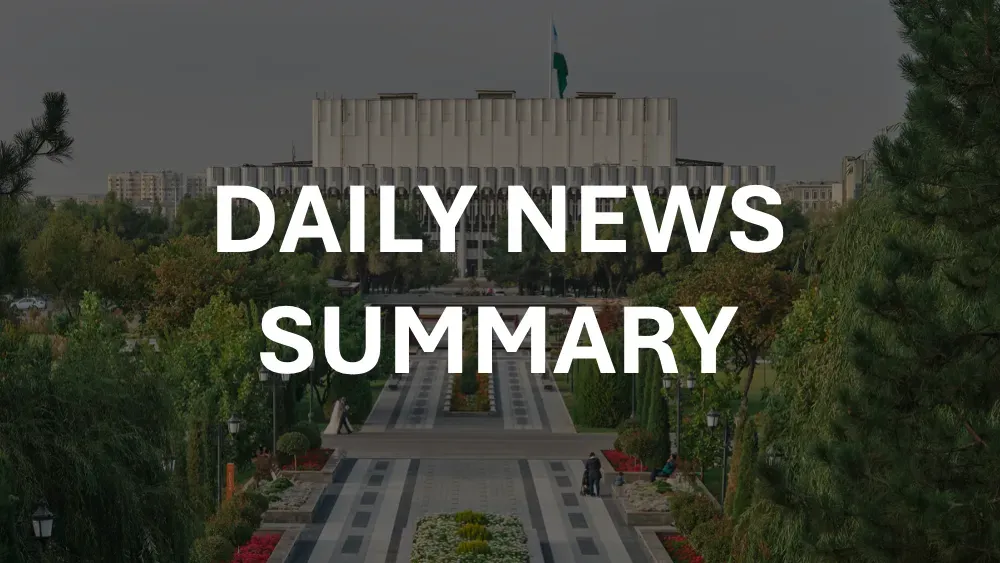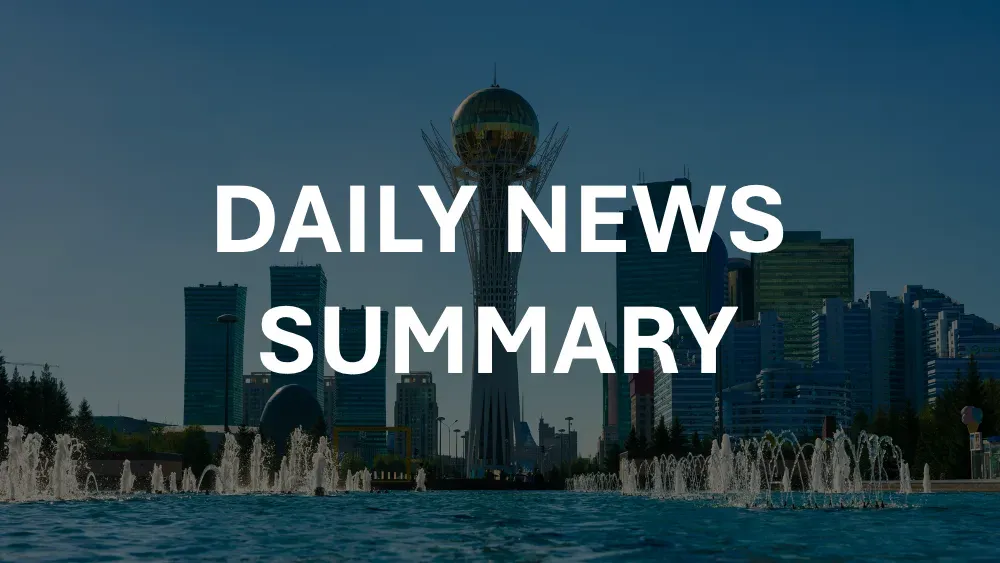This weekly digest showcases just 10 stories. Daily subscribers receive comprehensive intelligence briefs with 40 of the top stories organized by category. Don't miss the stories that matter.
Subscribe to Daily →
September 26, 2025 to October 2, 2025
This week's top 10 stories from Kyrgyzstan, selected from our daily intelligence briefs.
1. President Sets New Election Rules: Candidate-Funded Voting, Gender Allocation, and No By‑Elections
President Sadyr Japarov has decreed a major overhaul of Kyrgyzstan’s November 30, 2025 early parliamentary elections, moving to 30 multi‑member districts (three seats each) with single‑choice ballots, automated vote counting and expanded remote voting (2,492 domestic precincts and at least 59 abroad). Key institutional changes include a gender cap (no more than two seats per district for one gender, ensuring at least 30 of 90 seats go to women and reallocating the third seat to the highest‑polling man if the top three are women), automatic succession from runner‑up lists instead of by‑elections, and a compressed electoral calendar overseen by the Central Election Commission.
The reforms shift election financing and candidate access: nomination fees rise to non‑refundable 300,000 KGS (with concessions for disabled persons), and administration costs are to be borne by candidates rather than the state. Japarov pledged full digitization and his personal oversight, and urged citizen monitoring to deter vote‑buying—framing public vigilance as a supplement to limited enforcement capacity. The package tightens state neutrality rules but centralizes control and raises concerns among observers about equity of access, the deterrent effect of high fees, and whether digital systems and citizen policing will be sufficient to guarantee transparent, contestable results.
Local Coverage: kabar.kg, sputnik.kg, 24.kg, kyrgyztuusu.kg, azattyk.org
From daily briefs: 2025-10-01, 2025-10-02, 2025-10-03
2. Russian Refinery Strikes Drive Fuel Price Spikes in Kyrgyzstan
A surge of drone attacks on Russian oil refineries and fuel depots over the past year has repeatedly disrupted exports to Kyrgyzstan, driving retail gasoline price spikes each time major incidents trigger fires and temporary shutdowns. Kyrgyzstan imports roughly 95% of its petroleum products from Russia; tighter export quotas, repair timelines, logistical delays and reports of regional Russian shortages have forced wholesalers and stations to raise pump prices in Bishkek and elsewhere, exposing the country’s limited strategic reserves and heavy dependence on Moscow’s output.
The shocks increase risks to transportation, construction and agricultural inputs and could spur second‑round inflation if disruptions persist. Market participants are watching for signals on Russian export policy and repair schedules, while Bishkek faces pressure to diversify sources or secure state‑level guarantees—options include routing supplies via Kazakhstan, contracting Central Asian refiners, or building larger buffers—to mitigate further volatility.
Local Coverage: azattyk.org
From daily briefs: 2025-09-27, 2025-09-28
3. China–Kyrgyzstan–Uzbekistan Railway Moves Into Construction Phase
Kyrgyz officials and a delegation from China State Railway Group, led by deputy general manager Wang Lixin, confirmed that the China–Kyrgyzstan–Uzbekistan (CKU) railway has moved into a practical construction phase, with tunnel excavation, temporary infrastructure works and organizational arrangements already underway. Bishkek pledged interagency coordination and strict environmental and safety compliance, and both sides discussed freight-volume forecasting, establishment of a railway academy to train specialists, and creation of economic zones in Torugart, Makmal, Jerge-Tal and Jalal-Abad to anchor logistics and value-added services along the corridor.
Officials, including Deputy Prime Minister Bakyt Torobaev, emphasized increasing local labor participation and prioritizing Kyrgyz suppliers under the investment agreement, framing the project as a long-term regional connectivity and trade enabler. The talks signaled a push to localize economic benefits and build operational capacity; both parties agreed to jointly study near‑term technical and operational issues to support the corridor’s long‑term stability and commercial viability.
Local Coverage: kyrgyztuusu.kg, kabar.kg
From daily briefs: 2025-09-26, 2025-09-27
4. President Japarov to Address Nation in Prime-Time Live Broadcast
Kyrgyzstan’s President Sadyr Japarov will deliver a live nationwide address at 21:00 local time on September 30, airing across state broadcasters (UTRK, ElTR and other TV channels) and the presidency’s official social media pages, the presidential press secretary Askat Alagozov said. The administration did not disclose the agenda.
Prime‑time presidential addresses in Kyrgyzstan often indicate policy shifts or official responses to political or economic developments, so the synchronized multi‑platform broadcast suggests an intent to reach a broad domestic and international audience in real time and to shape the narrative at the start of the week. Officials, businesses and external stakeholders monitoring Central Asian stability should view the speech as a potential signal of government priorities or forthcoming measures.
Local Coverage: kabar.kg, 24.kg, kyrgyztuusu.kg
From daily brief: 2025-10-01
5. Regional Energy Ministers Advance Kambar-Ata-1 Hydropower Project in Brussels Talks
Energy ministers from Kyrgyzstan, Kazakhstan and Uzbekistan held a third round of talks in Brussels on the proposed Kambar-Ata-1 hydropower project, advancing studies and institutional planning ahead of a next meeting planned for October–November. The discussions concentrated on the feasibility study, social and environmental impact assessments, implementation pathways and engagement with international financial institutions to develop a multi-country financing and governance model after earlier rounds in Tashkent (January) and Dubai (May).
The project envisages a 5.4 billion cubic metre reservoir and a 1,860 MW plant expected to produce about 5.6 billion kWh annually. Officials framed Kambar-Ata-1 as a potential cornerstone for regional energy security and coordinated water use in Central Asia; progress in Brussels signals structured, sequential steps toward resolving technical, social and funding questions necessary for cross-border implementation.
Local Coverage: kabar.kg
From daily brief: 2025-09-30
6. Cabinet Takes Direct Control of Tax and Customs, Merges Alcohol Regulator into New Tax Service
Kyrgyzstan’s Cabinet of Ministers has taken direct oversight of the State Tax Service and the Customs Service under a reform signed by Prime Minister Adylbek Kasymaliyev, consolidating tax and customs functions outside the Finance Ministry and centralizing their reporting to the Cabinet. The agency regulating ethyl alcohol and alcoholic products will be merged into the reconstituted State Tax Service; the Economy and Commerce Ministry is assigned authority to design unified policy for alcohol, bioethanol and precious metals production and turnover. Revenue streams explicitly assigned to the tax and customs services include waste collection fees, license payments, customs duties and payments, fines and confiscations.
Most provisions of the reform come into force on January 1, with several norms effective within 10 days of the decree; several prior government decisions have been annulled. The restructuring redistributes regulatory and revenue-collection responsibilities across ministries and aims to streamline enforcement and policy coherence, while introducing AiSalyk, an AI tool intended to assist taxpayers—a move that could affect compliance processes and administrative capacity ahead of the January 1 implementation.
Local Coverage: sputnik.kg
From daily brief: 2025-09-28
7. Report Links President Japarov’s Travel to Business Jet Tied to Ilan Shor, Raising Sanctions Concerns
Moldovan outlet IPN reports that Kyrgyz President Sadyr Japarov has been using a Gulfstream G450 reportedly acquired via intermediaries for $17.9 million and linked to fugitive Moldovan oligarch Ilan Shor. Internal “Shor Group” documents cited by IPN indicate a lease-to-buy deal struck in December 2024, with the G450 delivered to Bishkek in March 2025 and managed through entities tied to aviation brokers Mangrove Jet Solutions and Zafer Air. IPN also traces a separate Gulfstream G650 purchase of $21.8 million routed through Shor confidant Viktor Gutsulyak; Flightradar shows the G650 arriving in Bishkek on 4 September 2025, though its user remains unclear. The presidential administration has not commented.
The revelations carry geopolitical and sanctions implications: Shor is subject to prior U.S. and U.K. actions for alleged sanctions evasion involving Kyrgyz banks, and these aircraft transactions could expose Kyrgyz officials to secondary sanctions or reputational risk. President Japarov, who recently decried “unilateral sanctions” at the UN, faces heightened scrutiny over potential links between state travel and assets tied to a sanctioned oligarch, raising questions about governance, financial transparency, and compliance with international measures.
Local Coverage: kloop.asia
From daily brief: 2025-09-26
8. World Bank, Deputy PM Baysalov Discuss Fiscal Reforms and Stronger Social Protection
Deputy Prime Minister Edil Baysalov and World Bank Country Representative Hugh Riddell met to review the distributional impact of Kyrgyzstan’s fiscal policy, prioritizing efficiency gains, poverty reduction and social equity. The Bank recommended adopting a planning and execution methodology at the aiyl aimak (village) and district levels to improve targeting and delivery of programs, and both sides evaluated measures to strengthen the social protection system and support vulnerable households while sustaining positive macroeconomic trends.
The discussion concluded with a commitment to deepen implementation cooperation and advance joint initiatives for durable socio‑economic development; Baysalov thanked the World Bank for its support and Riddell highlighted that Kyrgyzstan’s favorable economic indicators make further collaboration timely.
Local Coverage: kabar.kg
From daily brief: 2025-10-01
9. 24 Officials Detained in Alleged Multi-Agency Smuggling Scheme at Chaldovar Border Post
Kyrgyzstan’s State Committee for National Security (SCNS) says it dismantled an alleged multi-agency smuggling and corruption network at the Chaldovar‑Auto Road checkpoint (Chui region) that involved officers from the State Tax Service, Border Service, Veterinary and Phytosanitary Inspectorate, and the Transport Ministry’s weight‑control unit. Investigators allege staff colluded with intermediaries to move goods from Eurasian Economic Union countries using falsified accompanying documents and undervalued shipments, with illicit payments routed in cash and via M‑Bank e‑wallets.
A September 24 operation led to the detention of 24 people — seven Tax Service officials, six Border Service officers, four Transport Ministry employees, six Agriculture Ministry staff and several intermediaries — all placed in SCNS temporary custody under Article 96 of the Criminal Code. The case underscores institutional vulnerabilities at a key transit point, risks to customs and trade integrity in the EEU, and ongoing probes to identify further participants.
Local Coverage: kabar.kg, sputnik.kg, 24.kg
From daily brief: 2025-09-27
10. Voter Rolls Published and Candidate Registration Opens with Online System for Nov 30 Parliamentary Elections
Kyrgyzstan will hold early parliamentary elections on 30 November to elect 90 deputies from 30 multi‑member districts (three seats each), with campaigning running 10 November–29 November and voting 08:00–20:00 on election day. The Central Election Commission (CEC) approved new constituency boundaries and published street‑level lists and voter counts (nationwide roll ~4.29 million as of 1 Oct, averaging ~142,900 voters per district within a ±20% legal band); Bishkek is divided into four constituencies. Preliminary voter lists will be posted on the state portal (www.tizme.gov.kg) by 8 October and at precincts by 14 October, with corrections accepted through 19 November (or 14 November under the compressed calendar) and applications to vote outside one’s precinct accepted until 28 November; biometric registration remains mandatory.
The authorities have introduced online tools for both voters (“Voter’s Cabinet”) and candidates (“Electronic Candidate”), and will check eligibility via the Tunduk interoperability system; candidate registration closes 10 November (document submission deadlines vary under the CEC’s compressed calendar). Officials frame these measures — plus new online voter identification enabling voting outside registered districts and tighter anti‑corruption enforcement under President Sadyr Japarov — as efforts to improve access and reduce prior abuses such as vote‑buying. Key implications for international observers and stakeholders include the shortened timetable, the technical rollout of e‑systems, and potential logistical confusion from boundary adjustments (for example, transfers between Bishkek and Alamedin or reassignments in Kara‑Suu).
Local Coverage: kabar.kg, kyrgyztuusu.kg, 24.kg, sputnik.kg
From daily briefs: 2025-10-02, 2025-10-03
About This Weekly Digest
The stories above represent the most significant developments from Kyrgyzstan this week, selected through our AI-powered analysis of hundreds of local news articles.
Stories are drawn from our daily intelligence briefs, which synthesize reporting from Kyrgyzstan's leading news sources to provide comprehensive situational awareness for international decision-makers.
These weekly highlights are a small sample of what's happening. Daily subscribers get comprehensive briefings with 40 top stories that connect the dots between events, track developing stories, and provide the context you need for informed decision-making.
Upgrade to Daily →






